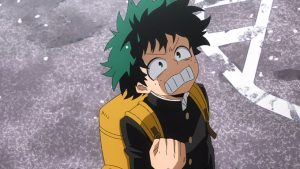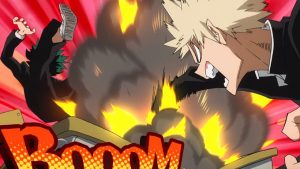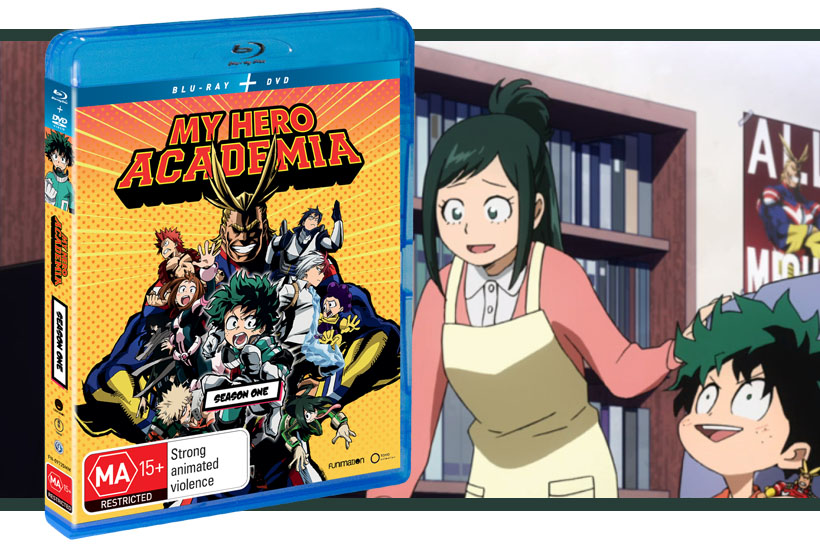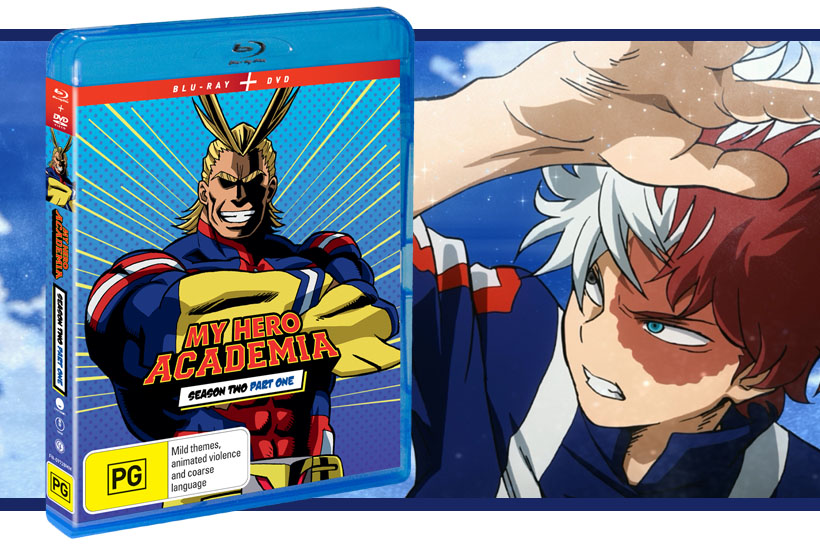In a world were humanity has manifested a variety of strange and amazing superpowers known as “quirks”, young Izuku Midoriya (nicknamed Deku) dreams of being a superhero like his idol and symbol of peace, All Might. While his intentions are noble, there’s just one problem – Deku is quirkless. But that doesn’t stop him from spending every spare moment studying heroes and their quirks so he can one day pursue his dream of attending a high school for heroes. A chance encounter with All Might reveals Deku’s penchant for strategic thinking and courage in the face of danger, and he begins training under the tutelage of his idol to attend one of the top hero school in Japan; U.A. High School.

From the beloved Studio Bones who have brought us such gems as Fullmetal Alchemist and Mob Psycho 100 (and countless others), comes the first season of My Hero Academia, a series that has achieved popular acclaim as a manga and anime that tackles the superhero genre with enough style and flare to really stand out among other entries in the genre. My Hero Academia Season 1 is a solid shonen anime with a with a fast-paced and imaginative approach to the exploration of quirks and their applications that makes the series fresh and exciting. While Deku’s persistent nature and the struggles he encounters as he attends U.A. and participates in school as a student of class 1-A are of course the heart of My Hero Academia, the series truly shines in its depiction of the variety of quirks that exist, the different ways they can be used, and the ways in which they manifest in individuals.
Quirks are depicted in a variety of cool ways – power over elements and super strength exists of course, but a majority of the quirks in the series are either very different or utilised in new and interesting ways, and this creativity is one of the series’ strong points. An example is Deku’s classmate Jiro, who has long earlobe jacks that she uses to listen through walls and to transmit the sound of her heartbeat to incapacitate foes. Tokoyami is a student with a black bird head, but that isn’t the sum of his quirk – he also commands a shadowy figure that inhabits his body. The creativity and the way in which quirks are utilised and their strengths and weaknesses is what lends My Hero Academia Season 1 and the series in general its fun and addictive atmosphere – battles between quirk users become increasingly interesting as we learn the peculiarities and limitations of these powers, and it’s fun to discover exactly what quirk each character possesses. This is all supported by the direction and animation of Studio Bones, from the animation of high-intensity and exciting action sequences as classmates show off their abilities by competing in school tests, fighting against robots and other students; to the way the series is good at maintaining the world it has created – you never forget that this is a society filled with superpowered individuals, with a variety of characters in the background of each shot designed to communicate the sheer variety of physical quirks that exist in a world where everyone has powers.

My Hero Academia Season 1 is a simple but solid anime, focusing on Deku’s experiences at U.A with his classmate in class 1-A and the training he undergoes on his path to become a hero. The premise of a youth attending a school of students with supernatural powers is a familiar setting in anime, but the series is still able to stand out with its creativity in the aforementioned depiction of quirks and extended cast of memorable characters. There are a ton of supporting characters in the series, with enough students in class 1-A alone to enjoy and pick favourites out of based on their distinctive personalities and quirks. However, the variety of cool characters in the series can be both a positive and a negative, as My Hero Academia Season 1 focuses a lot on Deku, his fellow classmate and childhood-friend-now-rival Bakugo, and All Might with little time for other characters to really have their moments. While I of course wanted my favourite picks to have more screen time, this focus does work fine when the series follows Deku’s training under All Might and his progress at U.A. High School. The lack of focus on Deku’s classmates and my personal favourites is understandable given the massive cast and to be fair they are given extra focus in later seasons. However, this focus does subtract from the villains of the series, who remain off-screen for most of the first season and only make an appearance in the finale when the stakes accelerate sharply to accommodate their appearance. It made the season finale feel somewhat jarring and disconnected from the earlier events of the season, with the last few episodes feeling removed from the reality of the first half. Additionally, while the first major appearance of the villains is accompanied by some excellent action (it’s Studio Bones, this is a given) and their presence is threatening, they are not particularly interesting in their own right due to what little time we’ve spent with them, which is a shame given how strong the rest of the cast is.
My Hero Academia Season 1 uses tropes related to the superhero genre quite freely – All Might is the typical muscly hero with a heart of gold like from the Superman or Captain America mould, and Deku is the resolute youngster who wants to prove he has what it takes to save people. Unfortunately the show also indulges in the tired anime trope of the one distasteful perverted kid in the class, but for the most part these tropes work to the series’ advantage by presenting familiar elements and then twisting them into something new and interesting, even sometimes shocking. All Might is not just a parody of the golden boy superhero archetype – he has a lot going on beneath the tough and smiley exterior he exhibits for the public, and Deku who reflects many a determined anime boy protagonist actually hurts himself really badly on multiple occasions as he pushes his abilities to prove he has what it takes to be at U.A. High School. Additionally, while they didn’t have a great first impression during their first appearance in series, the villains in My Hero Academia are intense and bold in a way that does create tangible danger for the protagonists and makes their actions scenes all the more enjoyable.

My Hero Academia Season 1 is a vibrant, fast-paced and solid introduction to the series, supported by excellently animated action sequences and an imaginative approach to superpowers that sets it apart from your standard hero fare. While the finale felt somewhat disconnected from the focus of the other episodes and the villain introduction suffered from their mostly off-screen presence this season, the overall style and delivery of the series won me over in the end. It’s not hard to see why My Hero Academia has captured the attention of anime and superhero fans alike, and I’m excited to see what season two will bring.
A review copy was provided by Madman Entertainment to the author for the purpose of this review.






Comments are closed.